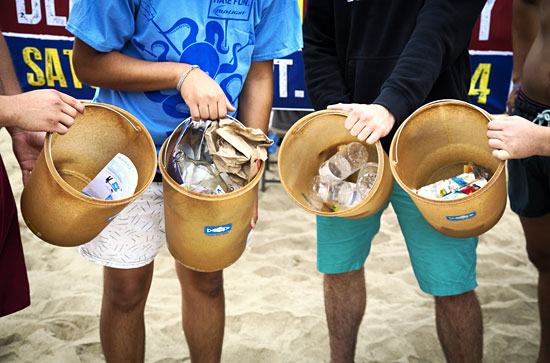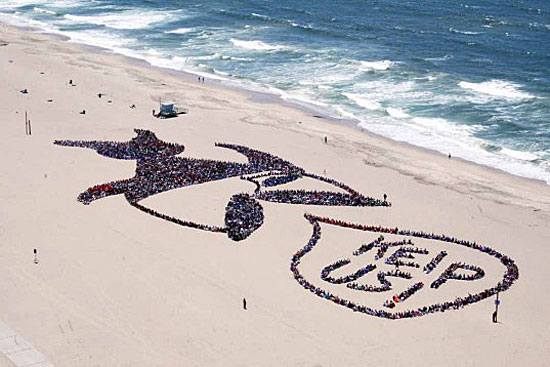
This year’s coastal cleanup turned up plenty of garbage, but fewer plastic bags.
A wedding gown, a polar bear suit, even a fake human skull — volunteers have turned up all sorts of discarded items on Coastal Cleanup Day in Los Angeles County.
This year, along with the usual cigarette butts and crumpled cans, they found a gun near the Malibu Pier and a piece of a firearm under the Redondo Beach Pier, triggering police investigations.
And, of course, they also found another kind of scary item that always seems to turn up amidst the heaps of sodden shoreline garbage: the single-use plastic bag, which is among the 10 types of litter most frequently collected in the ocean, lakes, rivers, creeks and storm drains.
But these days, the tide may be turning against the bag.
“We’ve seen a significant reduction in plastic bags as a component of what’s collected,” says Department of Public Works recycling and waste reduction program manager Coby Skye.
He said that data compiled by the environmental organization Heal the Bay, which analyzes samples of the trash its members and volunteers haul out of coastal and inland waterways, tells the story. In 2010, an estimated 5,000 plastic bags were collected. In 2011 and 2012, that number dropped to about 3,000. And by last year, the count was down to some 2,000.
“It stands to reason there’s going to be less waste because we know fewer plastic bags are being distributed,” said Heal the Bay spokesman Matthew King.
The rapid decline of littered, single-use bags, according to King and others, is a direct result of bans enacted throughout the region in recent years, including one approved in Los Angeles County by the Board of Supervisors in November, 2010. That one is now widely credited with setting the stage for California to recently become the first state in the nation to restrict single-use plastic bags.
In California, almost 20 billion plastic bags are used each year, many of which end up as litter, creating urban blight and flooding hazards. Animals can get tangled up in them, or mistake them for food and starve to death.
Since discarded plastic bags are non-biodegradable, they could harm wildlife and the environment for hundreds of years, and possibly as long as a millennium. Supervisor Zev Yaroslavsky, after voting to approve the ban, called them “urban tumbleweeds.”
San Francisco passed the first ban in the state 2007. Soon following suit were Malibu, Manhattan Beach, Fairfax and Palo Alto. But there, the momentum stopped, when other municipalities were scared off by lawsuits pushed by the plastic bag industry, which accused cities with bans of failing to prepare required environmental impact reports.
The county rendered that argument moot in November 2010 by passing an ordinance with an accompanying environmental impact report that focused on all cities within its boundaries, not just unincorporated areas.
“Soon after, jurisdiction after jurisdiction adopted bans,” Skye said, adding some of them copied the county’s ordinance verbatim and many of them relied on its environmental impact report.
“I think the fact that the county did it on a large scale made other regions more comfortable,” King said.
The city of Los Angeles became the largest city in the nation to ban plastic bags when it adopted an ordinance in June, 2013, that relied on data in the county’s environmental impact report.
The state, in its recent ban, also relied on the county’s ordinance.
Authored by state Senator Alex Padilla (D-Pacoima), SB 270 bans groceries and pharmacies from distributing plastic bags after July 2015. Convenience and liquor stores must comply a year later.
The state law would also provide up to $2 million in loans to businesses transitioning to manufacture reusable bags.
The plastic bag industry, however, is petitioning to repeal SB 270, arguing that 30,000 jobs are at stake and that unwashed reusable bags can breed dangerous bacteria.
In a statement posted on the American Progressive Bag Alliance website, Plastics Industry Trade Association President William Carteaux said: “The truth is singling out one product that makes only less than one percent of the U.S. municipal solid waste stream will have no meaningful impact on reducing litter,” he added. “Instead, it will result in forcing consumers to use products such as reusable bags, which are mostly imported from China, made from foreign oil and are not recyclable.”
If the Alliance can gather half a million signatures over a 90-day period to qualify a referendum, then the statewide plastic bag ban would be suspended pending the results of the November 2016 ballot.
King believes voters should uphold the ban.
“People often wonder, ‘Don’t we have bigger issues to worry about than plastic bags?’ ” he said. “Certainly, the state and the world are grappling with a lot of major issues but I do think plastic bags are important.”
“I like to call them a gateway issue because it gets people thinking about the impact of their other habits on the environment,” he added. “After a conversation about plastic bags, you might also start wondering, for example, whether to use single-use plastic water bottles to your kids’ soccer game or just bring a big thermos. It’s very positive to have this process, this debate.”

A sandy message of environmental solidarity was on display at a 2011 cleanup.
Posted 11/20/14






